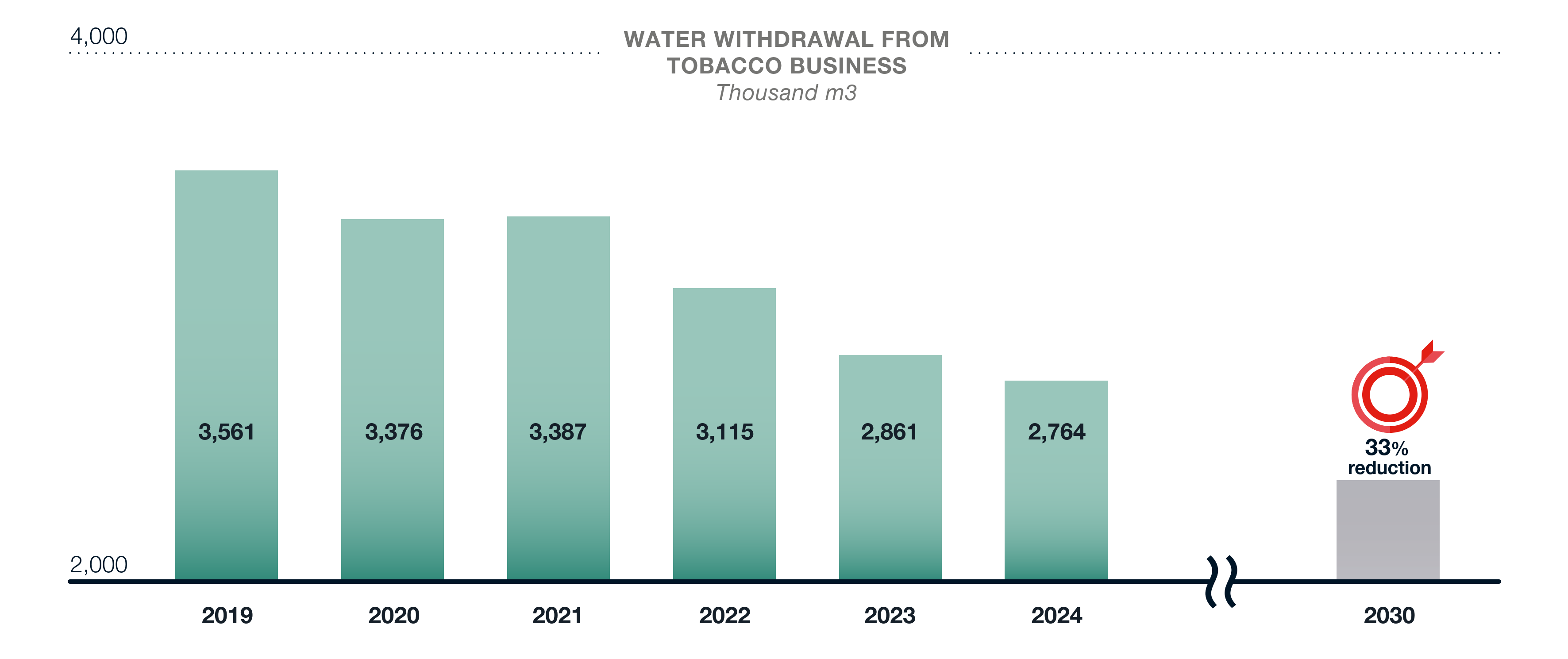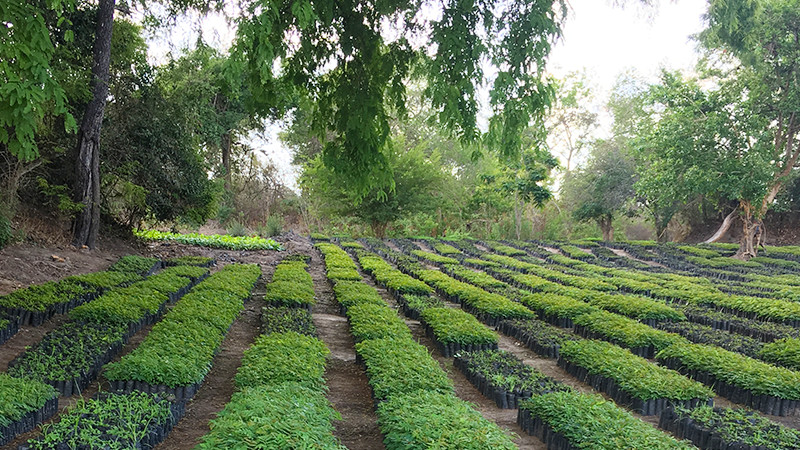Environment and our operations
Biodiversity, Water, Forestry, Sustainable agriculture
Biodiversity
We believe that people's lives, society, corporate activities, and the activities of all people are part of the ecosystem. In the “Living with the planet,” we aim to preserve the healthy relationship between nature and people and companies by improving the impact of our activities on the ecosystem.
In the JT Group Sustainability Targets, each of the JT Group businesses will perform assessments to evaluate its impact and dependency on ecosystem, including biodiversity aspects. Impact assessment of our tobacco business will be performed by 2024, and our processed food business by 2025.
Read more about the JT Group Sustainability Targets and 2024 Results.
We endorsed the Declaration of Biodiversity by Keidanren, which is an ambitious action guideline that summarizes specific biodiversity-related activities in Japan.
Please see the JT Group Biodiversity Statement for more on our commitment and ambitions.
Biodiversity impact assessment
In 2022, we conducted an initial risk assessment of our impact and dependency on biodiversity for our tobacco business, with reference to TNFD v0.3 and the International Union for Conservation of Nature’s (IUCN) guidelines. The scope of the assessment covers our own operations, upstream activities, and downstream activities.
The biodiversity impact assessment is a structured approach following the SBTN* methodology to better understand our tobacco business's relationship with Nature, including impacts and dependencies, to prioritize areas for intervention. The assessment conducted in 2024 comprised several key steps:
*Science Based Targets Network
- Baseline data collection on our tobacco business's value chain, markets and origins established a baseline for the assessment.
- A sector-level materiality assessment provided an initial overview and interpretation of our tobacco business's potential impacts and dependencies on biodiversity.
- Impacts and dependencies analysis quantified our tobacco business's impacts and dependencies on biodiversity. It included global analysis of environmental assets and a more detailed examination of specific countries, such as Brazil, Malawi, Zambia, Tanzania, Indonesia and Bangladesh.
-
Locations for intervention were prioritized across various spheres of influence, including direct operations, upstream value chain, adjacent areas, and systems.
The next steps are to develop location-specific action plans and extend the assessment to other elements of the value chain and refine our Nature strategy, targets and KPIs.
Read more about biodiversity on the JT international website.
Protecting water
Societal demand for water is increasing globally and water-related issues such as availability, quality, flooding, drought, or regulatory changes can have a major impact on society and our business.
In the JT Group Sustainability Targets, we commit to supporting global water stewardship by reducing our water withdrawal in our tobacco business’s operations by 33% by 2030 against a 2019 base year, and our tobacco business will have 100% of its eligible production facilities certified against the Alliance for Water Stewardship (AWS)* standard by 2030.
*AWS; Alliance for Water Stewardship is a global membership collaboration comprising businesses, NGOs and the public sector. Its members contribute to the sustainability of local water-resources through their adoption and promotion of a universal framework for the sustainable use of water - the International Water Stewardship Standard, or AWS Standard - that drives, recognizes and rewards good water stewardship performance.
As part of our approach to good water stewardship, we committed to carrying out water risk assessments at 100% of our factories. In 2020, we completed the first risk assessments at all of our factories, and we are continuously working on a program of reassessments including our suppliers. Our water risk assessments consider water availability and quality, changing legislation, natural disasters such as floods and drought, and future water stress. From the assessments, we develop action plans to reduce risk and improve overall water management and security.
We will work to improve water resource management through the acquisition of AWS certification and we will also work in collaboration with stakeholders to promote further water conservation and stewardship.
Read more about water stewardship on the JT international website.
Progress toward quantitative targets
By the end of 2024, we reduced water use associated with our tobacco business by 22% from 2019 through our initiative for efficient water use.

Forestry

The paper used in our products and the wood used as fuel in the tobacco curing process are important resources for our tobacco business. The JT Group considers initiatives to sustainably secure forestry resources in its supply chain to be of crucial importance, also for the sake of increasing biodiversity, and has cited “Enhancing biodiversity — No deforestation, no conversion” as one of the JT Group Sustainability Targets.
Our specific target is to eliminate deforestation of natural forests in the tobacco business’s own operations and supply chains for tobacco leaf, paper and pulp-based materials by 2025 and in our entire supply chain by 2030. Furthermore, we are aiming to eliminate conversion of natural ecosystem in high conservation value areas by 2025 and all natural lands by 2030. Furthermore, we will work toward zero net deforestation of managed natural forests in the entire tobacco business supply chain by 2030.
In 2025, we are working on strategies for certification and monitoring with regard to elimination of natural forest deforestation and conversion of natural ecosystems (DCF).*
*DCF: Deforestation and Conversion Free
Read more about forestry on the JT international website.
Progress toward qualitative targets
2024 was positioned as the year for preparing for efforts beyond 2025. Our tobacco business will implement its Deforestation and Conversion Free (DCF) monitoring and verification approach in 2025 and report on progress versus target in the next disclosure cycle.
Sustainable agriculture
In the tobacco business, tobacco leaf is an essential raw material. One of our JT Group Sustainability Targets is “sustainable agriculture,” including initiatives regarding agrichemicals, which have an undeniable impact on ecosystems.
As set in the JT Group Sustainability Targets, the JT Group's directly contracted tobacco leaf growers will eliminate the use of Criterion 1 HHPs by 2024, and all HHPs by 2040. By 2030, 100% of our directly contracted growers will have adopted our Good Agricultural Practices (GAP) Protocol.
Progress toward quantitative targets
We completed the elimination of Criterion 1 HHPs from our direct tobacco leaf supply chain as planned. We will promote ongoing initiatives with directly contracted growers to eliminate the use of all HHPs. The percentage of directly contracted growers adopting the GAP Protocol reached 86%.
Read more about sustainable agriculture on the JT international website.